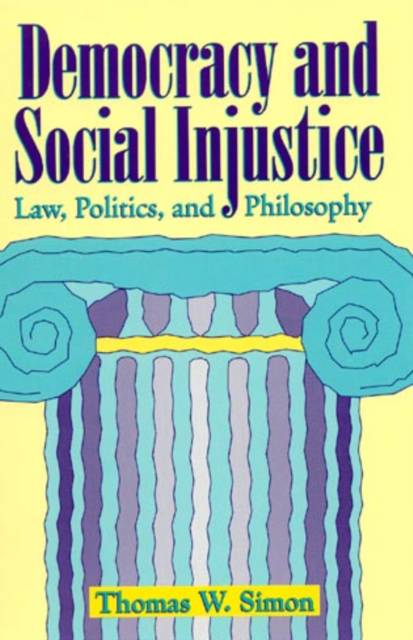
Door een staking bij bpost kan je online bestelling op dit moment iets langer onderweg zijn dan voorzien. Dringend iets nodig? Onze winkels ontvangen jou met open armen!
- Afhalen na 1 uur in een winkel met voorraad
- Gratis thuislevering in België vanaf € 30
- Ruim aanbod met 7 miljoen producten
Door een staking bij bpost kan je online bestelling op dit moment iets langer onderweg zijn dan voorzien. Dringend iets nodig? Onze winkels ontvangen jou met open armen!
- Afhalen na 1 uur in een winkel met voorraad
- Gratis thuislevering in België vanaf € 30
- Ruim aanbod met 7 miljoen producten
Zoeken
Omschrijving
In this truly interdisciplinary study that reflects the author's work in philosophy, political science, law, and policy studies, Thomas W. Simon argues that democratic theory must address the social injustices inflicted upon disadvantaged groups. By shifting theoretical sights from justice to injustice, Simon recasts the nature of democracy and provides a new perspective on social problems. He examines the causes and effects of injustice, victims' responses to injustice, and historical theories of disadvantage, revealing that those theories have important repercussions for contemporary policy debates. Finally, Simon considers which institutions and practices come within the grasp of democracy and discusses the concept of a 'Negative Utopia, ' or a future without injustice
Specificaties
Betrokkenen
- Auteur(s):
- Uitgeverij:
Inhoud
- Aantal bladzijden:
- 320
- Taal:
- Engels
- Reeks:
Eigenschappen
- Productcode (EAN):
- 9780847679386
- Verschijningsdatum:
- 21/02/1995
- Uitvoering:
- Paperback
- Formaat:
- Trade paperback (VS)
- Afmetingen:
- 152 mm x 229 mm
- Gewicht:
- 453 g

Alleen bij Standaard Boekhandel
+ 103 punten op je klantenkaart van Standaard Boekhandel
Beoordelingen
We publiceren alleen reviews die voldoen aan de voorwaarden voor reviews. Bekijk onze voorwaarden voor reviews.











